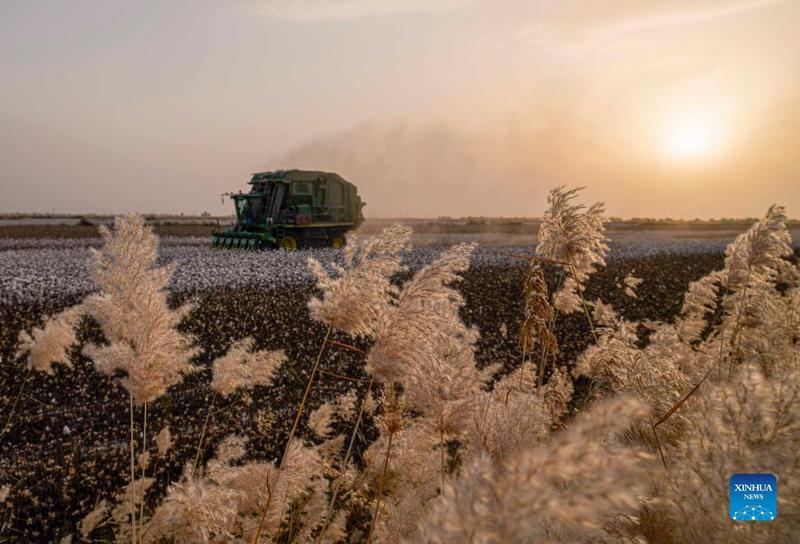


Government officials, experts and cotton farmers from northwest China's Xinjiang Uygur Autonomous Region have denounced accusations of so-called "forced labor" in the region fabricated by Western anti-China forces.

A cotton picker works in the fields of Erken Reyimu in Yuli County, northwest China's Xinjiang Uygur Autonomous Region, Oct. 24, 2021. (Xinhua/Zhao Ge)
The so-called "forced labor" are totally lies fabricated by Western anti-China forces, they told a press conference held in the regional capital Urumqi on Wednesday.
With unique natural conditions, Xinjiang is the largest high-quality cotton production base in China and an important producer of the crop in the world.
Xinjiang has seen mechanized and intelligent cotton planting in recent years. The development of the cotton industry has improved the lives of growers, textile workers and their families.
Emer Turhun, a cotton grower from Aksu Prefecture, said with cotton-picking machines, he can use less than a week to finish harvesting work in his 1,900 mu (about 127 hectares) field. His family rakes in an annual income totaling 1 million yuan (more than 155,000 U.S. dollars) from cotton farming.
The so-called "forced labor" is groundless and ridiculous, said Emer Turhun. "I grow cotton on my own farmland and make a profit from cotton farming. How can it be 'forced labor'?"
Anti-China forces in the United States and some other Western countries ignored facts and truth, imposing sanctions on Xinjiang's related industries and enterprises under the pretext of so-called "forced labor," said Erkin Samusak, deputy head of Law School of Xinjiang University.
"They (anti-China forces) attempt to undermine Xinjiang's development and stability, leaving all ethnic groups in the region in poverty, isolation and backwardness to achieve their sinister intention to create chaos in Xinjiang," Erkin Samusak added.
At the press conference, Xu Tao, deputy head of the regional department of agriculture and rural affairs, threw light on the state of cotton production this year in Xinjiang, which he said has seen an increase in the quantity and quality of the fiber crop.
